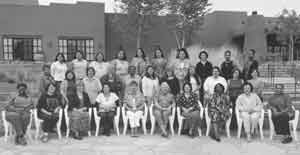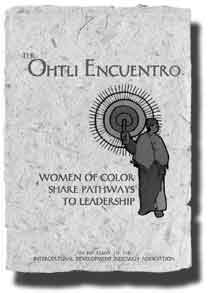• by Rosana G. Rodríguez, Ph.D., and Pam McCollum, Ph.D. • IDRA Newsletter • April 2005
 Throughout generations, women of color have been a positive and creative force that has sustained their families and communities with energy, courage and persistence. However, their contributions and the valuable resource they represent have too often been overlooked, minimized or viewed in deficit terms.
Throughout generations, women of color have been a positive and creative force that has sustained their families and communities with energy, courage and persistence. However, their contributions and the valuable resource they represent have too often been overlooked, minimized or viewed in deficit terms.
Few opportunities have emerged to recognize and draw upon the inherent strength and leadership skills that can be found in communities of color and the women leaders who are the change-agents within them. Therefore, it is timely and important for their inspiring stories to emerge and be celebrated by the broader society.
The Intercultural Development Research Association project, Ohtli, funded by the W.K. Kellogg Foundation, convened 30 women leaders of color from Native American, African American and Latina traditions to capture, honor and share their inspiring stories of leadership. The word ohtli means “pathway” in the Nahuatl (Mexican indigenous) language.

Ohtli Encuentro Leaders – Bottom Row (left to right): Joycelyn Jackson; Gwen Shunatona; María Robledo Montecel; Dolores Huerta; María Antonietta Berriozábal; Henrietta Mann; Elouise Cobell; Beverly Divers-White; Ruth Simmons Herts; Angelia Hudson Second Row: Valerie Webb-Jaramillo; Carmen Tafolla; Elise García; Hilda Gutiérrez Baldoquín; Louise Dunbar; Nicole Adams; Karen Sánchez-Griego; Gabrielle Strong; Teresa Peterson; Claudia Martínez; Anna Alicia Romero Top Row: Kelly Concho; Kaffia Howard; Yolanda Chacon-Serna; Kenya Eddings; Derrith Watchman-Moore; Melissa Campobasso; Janice Coburn; Gina Hinojosa; Tanisha Taylor; Alexis Sampson
Five established leaders were selected from each of the three invited groups, who, in turn, each invited an emerging leader to attend the Ohtli Encuentro, or conference, held in New Mexico. This unprecedented event provided a space for the voices of leadership from minority women’s perspectives to be heard, honored and shared with others.
Four dimensions, or pathways, of leadership were shared by the women as they told their personal stories: (1) history, language and culture; (2) community engagement; (3) vision, spirit and values; and (4) social change and institutional transformation.
What kind of leadership will be needed for the future? We believe a definition of leadership must be viewed through several diverse lenses. Older models of hierarchical, top-down leadership (“power over” others) are ill-suited to meet the challenges of this millennium.
Much of the current leadership literature cites the effectiveness of a more inclusive, participatory, and intergenerational model that stresses “power with” others. A shift in the traditional constructs of leadership seems to be emerging as our society acknowledges the need for more diverse models of leadership that stress the importance of interaction with others, our communities and our educational systems.
The Ohtli women’s sharing of their leadership pathways demonstrated their ability to lead in participatory ways for the betterment of their communities and families while performing high-powered mainstream jobs.
Access and equity in terms of education was a salient theme across the women’s leadership stories in all three racial and ethnic groups. Due to the deeply felt importance of quality education in the lives of the Ohtli women and their families, education provides a natural focus for future collaborative work across these groups. Acknowledging the existing resources that are present in communities and families and using them as a base for improving education for all children is a timely and vital effort.
The Ohtli project sought to create a cadre of intergenerational leaders who share and support each other’s journeys within their institutions and communities, to add to the understanding of new models of thinking about access to education and leadership opportunities for minority populations, and to provide insight into new roles of leadership. Such work seeks to expand engagement in educational institutions and communities.
IDRA has long recognized that leadership is not for an “elite” few, but rather, is an awareness and disposition that all people can develop and cultivate within their culture, family, organization and community.
IDRA will release the compendium of the Ohtli women’s stories in a book titled The Ohtli Encuentro: Women of Color Share Pathways to Leadership on May 2, 2005, at a book signing and leadership event hosted by IDRA and St. Mary’s University.
IDRA salutes the courage, strength and personal journey of each of the Ohtli women. Their voices, experiences, and examples along their leadership pathways inspire us to re-examine educational and institutional practices to strengthen public schools for all children.
Book Release ~ Mark Your Calendar!
 The Ohtli Encuentro
The Ohtli Encuentro
Women of Color
Share Pathways to Leadership
A unique book that shares the wisdom of African American, Latina and Native American leaders
May 2, 2005 ~ 6:00 p.m. to 8:00 p.m.
St. Mary’s University, San Antonio
University Center, Conference Room A
Watch the IDRA web site for more information
wwww.idra.org
Hosted by:
Intercultural Development Research Association and the 21st Century Leadership Center, St. Mary’s University
First printing by: Sorjuana Press
“From a Native perspective, I have come to know the difference between leadership that is earned and leadership that is appointed. It is
about what people stand for. Character is the foundation of a leader.
The skills are learned and develop over time.”
– Gabrielle Strong,
Ohtli participant
“As an African American who happens to be a woman, I already
had two strikes against me. It was never enough just to ‘get by.’
Through both word and deed, I learned the art of ‘wearing the mask’;
mastering and embracing the culture which was not mine,
all the while holding on to and never giving up
on the one which welcomed my birth.”
–Kenya Eddings,
Ohtli participant
“Any time you get people fighting over crumbs you don’t get the cake.
You get the crumbs. Multi- and cross-cultural work is what is going
to make us politically strong. If we are divided, we will be weak.
Women have to stand together. We are the bearers of the future.”
– Dolores Huerta,
Ohtli participant
Rosana G. Rodríguez, Ph.D., is director of the IDRA Division of Community and Public Engagement. Pam McCollum, Ph.D., is a senior education associate in the IDRA Division of Professional Development. Comments and questions may be directed to them via e-mail at feedback@idra.org.
[©2005, IDRA. This article originally appeared in the April 2005 IDRA Newsletter by the Intercultural Development Research Association. Permission to reproduce this article is granted provided the article is reprinted in its entirety and proper credit is given to IDRA and the author.]


